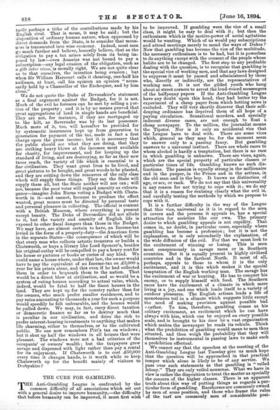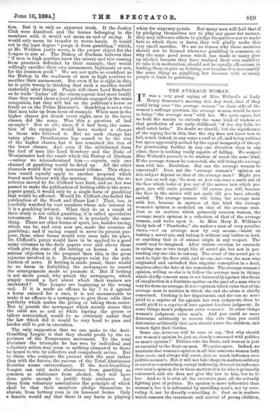THE CURE FOR GAMBLING.
mHE Anti-Gambling League is confronted by the common difficulty of all associations which set out with a general desire to improve humanity,—the difficulty that before humanity can be improved, it must first wish to be improved. If gambling were the vice of a small class, it might be easy to deal with it; but then the enthusiasm which is the motive-power of social agitations would be wanting. Which of us would pay subscriptions and attend meetings merely to mend the ways of Dukes ? Now that gambling has become the vice of the multitude, the necessary enthusiasm is to be had, but it is powerless to do anything except with the consent of the people whose habits are to be changed. The first step to any profitable dealing with the question, is to recognise that gambling is the special vice of working men, and that any laws designed to suppress it must be passed and administered by those who, directly or indirectly, are the representatives of working men. It is not the gilded youth who hang about at street corners to arrest the loud-voiced messengers of the halfpenny papers If the Anti-Gambling League have any doubt upon this head, they had better try the experiment of a cheap paper from which betting news is excluded. They will very shortly discover that their self- denying ordinance has deprived them of all hope of a paying circulation. Sensational murders, and specially indecent divorce cases, are not enough to float a cheap newspaper. To the million, the journalist means the Tipster. Nor is it only an accidental vice that the League have to deal with. There are some vices which, general as they may be, for the moment seem to answer only to a passing fancy. But gambling answers to a universal instinct. There are whole races to whom alcohol is hardly a temptation, but there is no race in which gambling is unknown. There are vices, again, which are the special property of particular classes or particular times of life. Gambling knows no such dis- tinctions. The passion is equally strong in the millionaire and in the pauper, in the Prince and in the artisan, in the old man and in the boy. It knows no distinction of age, or sex, or rank. We do not say that this universality is any reason for not trying to cope with it ; we do say that it is a reason for realising clearly what the evil is, and carefully testing the methods by which we propose to cope with it.
It is a further difficulty in the way of the League that this vice, universal as it is in regard to the area it covers and the persons it appeals to, has a special attraction for societies like our own. The primary desire to which gambling appeals is not cupidity. That comes in, no doubt, in particular cases, especially where gambling has become a profession ; but it is not the explanation, or is only secondarily the explanation, of the wide diffusion of the evil. For that we must look to the excitement of winning or losing. This is seen most conspicuously in savage races or in Southern countries. But it is equally present in highly civilised countries and in the farthest North. It most of all, perhaps, appeals to those to whom it is the only excitement, and it is this which makes it the special temptation of the English working man. The savage has the excitement of war or hunting. He has to conquer his enemy, or to supply himself with food. The Southern races have the excitement of a climate in which mere hving is a joy, and one which lends itself to a variety of outdoor pleasures. The English artisan leads a life of monotonous toil in a climate which suggests little except the need of making provision against possible bad. eather. To him, therefore, gambling cornea as his solitary excitement, an excitement which he can have always with him, which can be enjoyed on every possible scale, and is brought to his door by a vast organisation which makes the newspaper he reads its vehicle. Think what the prohibition of gambling would mean to men thus situated, and then weigh the probability that they will themselves be instrumental in passing laws to make such a prohibition effectual.
We cannot say that the speeches at the meeting of the Anti-Gambling League last Tuesday give us much hope that the question will be approached in that practical temper which alone is likely to be of any service. We pass over such statements as that gambling is "veiled felony." They are only veiled nonsense. What we have in view is rather the disposition to treat the matter as specially the concern of the higher classes. There is an apparent truth about this way of putting things as regards a par- ticular form of gambling. Racehorses are commonly owned by men of some position, and those who frame the rules of the turf are commonly men of considerable posi- tion. But it is only an apparent truth. If the Jockey Club were dissolved, and the horses belonging to the members sold, it would not mean an end of racing. It would only mean its transfer to worse hands. It would not in the least degree "purge it from gambling," which, as Mr. Welldon justly wrote, is the proper object for the League to aim at. The Bishop of Durham believes that "if men in high position knew the misery and vice coming from practices defended by their example, they would willingly sacrifice their own amusement, legitimate or not, for the common good." We are not quite so confident as the Bishop in the readiness of men in high position to sacrifice their amusement. But even if he is right in this, he is quite wrong in thinking that such a sacrifice would. materially alter things. People will cheer Lord Rosebery as he leads Ladas ' off the course a great deal more loudly than they would cheer a local publican engaged in the same occupation, but they will bet on the publican's horse as freely as on the Prime Minister's. G-ambling is not a vice that men take up from force of example. When men in the higher classes got drunk every night, men in the lower classes did the same. Was this a question of bad example ? Not at all ; since, if it had been, the cessa- tion of the example would have worked a change in those who followed it. But no such change has taken place. Drunkenness has ceased to be the vice of the higher classes but it has remained the vice of the lower classes. And even if the withdrawal from the turf of men like Lord Rosebery and the Duke of Westminster had the result which the Bishop of Durham —unless we misunderstand him..—. expects, only one channel of gambling would be dried up. All the other channels would flow with increased volume. This objec- tion would equally apply to another proposal which found much favour with the meeting. Supposing the re- solution moved by Dr. Clifford bore fruit, and an Act was passed to make the publication of betting odds in the news- papers penal, it would only be a single form of gambling that would be affected. Would Dr. Clifford also forbid the publication of the Stock and Share List ? That, too, is carefully watched by vast numbers whose sole interest in it is a gambling interest. What they do as a result of their study is not called gambling, it is called speculative investment. But in its nature it is precisely the same thing. There are other forms of sport, too, besides racing, which can be, and even now are made the occasion of gambling ; and if racing ceased to serve its present pur- pose, these other forms would very soon fake its place. Dr. Clifford's purge would have to be applied to a good many columns in the daily papers over and above those which give the state of the betting on horses. A more serious objection to the proposal than this, is the gross injustice involved in it. Newspapers exist for the pub- lication of news. If betting is made penal, there would be no harm in forbidding the newspapers to record the arrangements made to promote it. But if betting is not Made penal, why attack the newspapers, which simply record a fact about which their readers are interested ? The League are beginning at the wrong end. If it is made an offence to lay 7 to 2 against a horse entered for a race, it is not unreasonable to make it an offence in a newspaper to give these odds that publicity which makes the giving or taking them easier. But to punish the newspaper which merely states that the odds are so and so while leaving the givers or takers unpunished, would be so obviously unfair that the law which did it would be very hard to pass and harder still to put in execution.
The only suggestion that we can make to the Anti. GamblingLeague is that they should profit by the ex- perience of the Temperance movement. To the total abstainer the triumphs he has won by individual and voluntary action may seem as nothing compared to those he hopes to win by collective and compulsory action. But to those who compare the present with the past rather than with the future, the success of the Total Abstinence Societies seems extraordinary. If the Anti-Gambling League can only make abstinence from gambling as common as abstinence from alcohol, they will have done quite enough to justify their existence. Let them form voluntary associations the principle of which shall be that their members pledge themselves to abstain from betting even in its innocent forms. Only a fanatic would say that there is any harm in playing whist for sixpenny points. But many men will feel that if by pledging themselves not to play any game for money, they may influence others to pledge themselves not to make bets in which there is harm, they will gladly make this very small sacrifice. We see no reason why these societies should not be formed wherever gambling is common, or why the same good sense which has made so many give up alcohol because they have realised their own inability to take it in moderation, should not be equally efficacious in leading them to give up betting, not because it is necessarily the same thing as gambling, but because with so many people it leads to gambling.



































 Previous page
Previous page